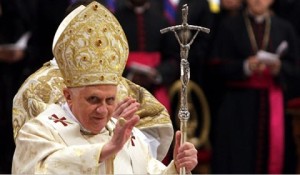Pope Benedict changes conclave laws
Pope Benedict XVI has amended Roman Catholic church law so that the conclave selecting his successor can be brought forward, the Vatican says.
The change to the constitution means cardinals will no longer have to wait 15 days after the papacy becomes vacant before beginning the conclave.
As a result, the conclave can now start before 15 March.
Pope Benedict XVI’s resignation, the first by a pope in nearly 600 years, takes effect on Thursday 28 February.
His decision surprised many within the Catholic Church.
“I leave the College of Cardinals the possibility to bring forward the start of the conclave once all cardinals are present, or push the beginning of the election back by a few days should there be serious reasons,” the Pope said in a statement read by his spokesman, Father Federico Lombardi.
Vatican officials explained that the change was partly due to the fact that the church constitution was written principally for a conclave following the death of a pope, rather than a resignation.
Easter rush
The decision on the date of the beginning of the conclave will be taken by the cardinals but will not happen earlier than 1 March, officials said.
A conclave beginning in mid-March would have left little time to have a new pope installed for one of the most important periods in the Catholic calendar, as Holy Week, leading up to Easter, begins on 24 March.
The BBC’s David Willey, at the Vatican, says that the Pope has, throughout these changes, indicated that he wants to limit the power vacuum inside the Vatican to the shortest possible time after he leaves office on Thursday.
Our correspondent said it is now widely expected that the cardinals will lock themselves away in the conclave in about two weeks’ time – around the weekend of 11 March.
The process of choosing a new pope involves cardinals from across the world gathering in Rome where they will then carry out a series of secret ballots until one of their number receives a majority of two-thirds of the votes.
The news about the timing of the conclave comes as the Pope accepted the resignation of the Roman Catholic Church’s highest cleric in Britain, Cardinal Keith O’Brien.
It follows allegations – which he contests – of inappropriate behaviour towards priests dating from the 1980s.
Vatican officials said that Cardinal O’Brien’s resignation was linked to the fact that he was approaching his 75th birthday and the Pope was keen to accept resignations and get business going ahead of his own resignation taking effect.
Cardinal O’Brien has confirmed he will not take part in the conclave to elect Pope Benedict’s successor.
The Vatican also said that the contents of a report prepared by a commission tasked with investigating the leaks of confidential information would remain secret and would be passed on to the new pope.
14 tourist killed in Egypt
Fourteen tourists on a hot air balloon ride in southern Egypt were killed Tuesday when the balloon exploded and plummeted to the ground, authorities said.
It was the deadliest hot air balloon accident in the world in at least 20 years.
Twenty-one people were in the balloon when it dropped about 300 meters (almost 1,000 feet) in the city of Luxor, the Egyptian interior ministry said.
A gas explosion caused the crash, state-run EgyNews reported.
Earlier, EgyNews said 19 tourists had been killed but later revised that number down to 14.
Passengers in the balloon included 19 foreign tourists: nine from Hong Kong, four from Japan, three from Britain, two from France and one from Hungary, officials said.
An Egyptian pilot and another Egyptian were also on board, Luxor province spokesman Badawi al-Masri said.
Three people — two Britons and the pilot — are hospitalized, and four passengers remain missing.
Balloon rides offering panoramic aerial views of the Nile River and the ancient temples of Karnak and Hatshepsut are a popular tourist attraction in Luxor, about nine hours’ drive southeast of Cairo.
“You can see Valley of the Kings in the background bordered by farmland,” Pauline Liang of Vancouver, Canada, told CNN’s iReport last year. “Below were banana farms, and behind us was the city of Luxor. There was a great contrast between desert landscape, lush farmland and urban development.”
Tuesday’s crash prompted Gov. Izzat Saad of Luxor province to ban all hot air balloon flights until further notice.
The last hot air balloon accident in Luxor occurred in 2009, when 16 foreign tourists were injured after a balloon struck a cell phone transmission tower.
Until Tuesday’s incident, the deadliest accident in recent memory took place in 1989, when 13 people were killed after two hot air balloons collided in Australia.
Egyptian government spokesman Alaa Hadidi announced the Cabinet will form a committee from the Ministry of Civil Aviation to investigate the cause of Tuesday’s accident, EgyNews said.
Candidates running for the presidency in Kenya went head to head in a final televised debate before one of the most highly contested election in the nation’s history.
Eight candidates, some of whom have been in public office for years, were on Monday taken to task to defend past actions and answer accusations of corruption in the run-up to the March 4 vote.
Al Jazeera’s Mohamed Adow, reporting from Nairoibi, said that corruption was also a big issue in the debates.
“The gloves came off on the segment of the debate when the candidates were questioned on corruption,” he said. “It seemed like each and every one of them had something to answer for, something in their past.”

